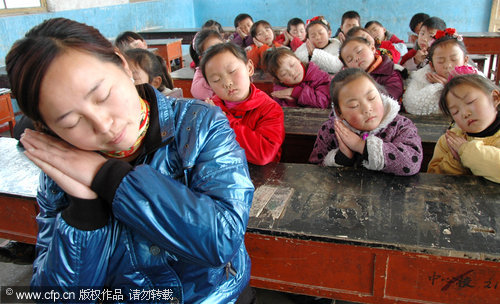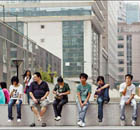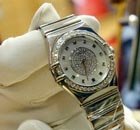Society
You're getting sleeeeeeeeepy
By Shi Yingying (China Daily)
Updated: 2010-03-22 08:49
 |
Large Medium Small |
SHANGHAI - Hey, wake up!
The speed of modern life and increasing pressure at work is making it more difficult for people in this eastern economic hub to get a decent night's sleep, showed a survey done for World Sleep Day, which fell on Sunday.
 Children take a "sleep class" ahead of World Sleep Day at a primary school last Friday in Nanyang, Central China's Henan province. [Photo/CFP] |
Conducted by the Shanghai Institution of Traditional Chinese Medicine for Sleep Disorders, the survey shows about 38 percent of adults in the city suffer some form of insomnia. The number of women with insomnia is 1.5 times that of men.
Based on the city's population of 19 million, this means more than 7 million people in the city are "tossing and turning" every night in order to get to sleep.
Doctors have warned about the side effects of sleep deprivation, which can cause car accidents, depression, anxiety and cardiovascular problems. Studies also show that sleep disorders affect people's memory, emotions and learning ability.
With the majority of people having difficulties sleeping being in their 20s and 30s, over 80 percent of white collar workers in Shanghai claim they do not have enough sleep.
"If a person is working more, he or she borrows that time from sleep and that's a bad loan," said psychologist Li Xinzhao who works in a psychological consulting company.
"Our society has valued people bragging about being able to function on very little sleep as a mark of someone who is aggressive, dynamic and successful. That's wrong," said Li.
"Admire someone who puts focus on sleep and is not making mistakes from sleep deprivation," she said.
Chen Yejiong, 38, and her 5-year-old daughter Zhuang Zhuang would be lucky to only suffer from insomnia.
"I still remember two months ago when I was too weak to get out of bed because of dizziness," said Chen, who works in a bank with huge daily pressures.
"The doctor told me it was due to a defect in my body's balance that usually wouldn't show any symptoms, but with a lack of sleep it makes me feel like I'm falling even when I'm sitting on a chair," she said.
While Chen was forced to take a two-week break from work and get her health back, her kindergarten daughter Zhuang Zhuang had already fought with sleep difficulties for five years. "I can't sleep at night because it's so itchy," said the girl, who was born with hypersensitive skin.
Sleep disorders are not just an issue for adults, according to a survey from the National Pediatric Sleep Medicine Collaborative Group.
Its sample of 3 million children from eight cities in China shows 27 percent are suffering from child sleep disorders.
"If your child finds it difficult to concentrate, or easy to sink into a state of depression or impatience, you should pay attention to his or her sleep," said Jiang Fan, professor from Shanghai Children's Medical Center.
The situation is not any better across the world. Released last week, the World Health Organization's survey on more than 25,000 people from 14 countries showed that 27 percent of them have different levels of sleep problems. Americans are among the worst with 32 to 50 percent of them stressed by insomnia, according to the survey.
Former US president Bill Clinton recently admitted that lack of sleep added to some of his health problems.
"I didn't sleep much for a month. That probably accelerated what was already going on," Clinton said as he counseled young people to make smart health choices while they are young to improve their lives in later years.







